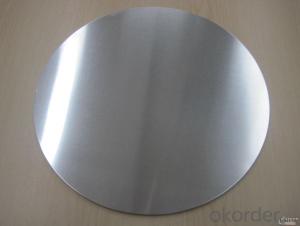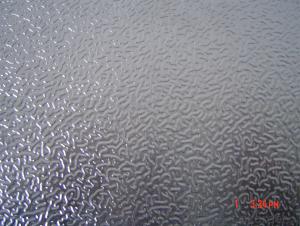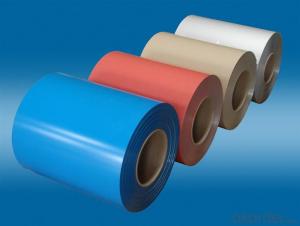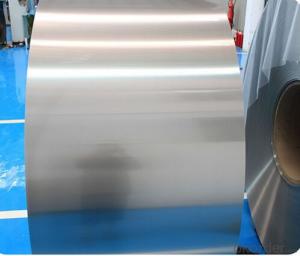CC Aluminium Circle in Thin Thickness for Pot Lid
- Loading Port:
- Shanghai
- Payment Terms:
- TT OR LC
- Min Order Qty:
- 5 m.t.
- Supply Capability:
- 1000 m.t./month
OKorder Service Pledge
OKorder Financial Service
You Might Also Like
Item specifice
1. Structure of CC Aluminium Circle in Thin Thickness for Pot Lid Description
CC Aluminium Circle in Thin Thickness for Pot Lid is one semi-finished aluminium material. This coil can be rolled down to aluminium coil,sheet,circle ect. The alloy AA1050 is widly used in building, industry ect. Its weight is much lower than steel. So many customers choosed aluminium material instead of steel.
2. Specification of CC Aluminium Circle in Thin Thickness for Pot Lid
CC Aluminium Circle in Thin Thickness for Pot Lid | |
Main Specification | |
Alloy | AA1xxx (AA1050, AA1060, AA1070, AA1100 etc.) |
AA3xxx (AA3003, AA3004, AA3005, AA3105 etc.) | |
AA5xxx, AA6XXX (AA5052,AA5083, AA5754, AA6061, AA6062 etc.) | |
AA8xxx(AA8011, AA8006 etc.) | |
Temper | H14,H16, H18, H22, H24, H26, H32,O/F, T4, T6, T651 |
Thickmess | 0.01mm-100mm |
Width | 30mm-1700mm |
Standard | GB/T 3880-2006/ASTM |
Special specification is available on customer's requirement | |
3. Application of CC Aluminium Circle in Thin Thickness for Pot Lid
(1).Interior: wall cladding, ceilings, bathrooms, kitchens and balconies, shutters, doors...
(2).Exterior: wall cladding, facades, roofing, canopies, tunnels,column covers , renovations...
(3).Advertisement: display platforms, signboards, fascia, shop fronts...
4. Feature of CC Aluminium Circle in Thin Thickness for Pot Lid
Surfact Quality :
Be free from Oil Stain, Dent, Inclusion, Scratches, Stain, Oxide Dicoloration, Breaks, Corrosion, Roll Marks, Dirt Streaks and other defect which will interfere with use,
Mechenical Property:
Chemical Composite and Mechanical Property
5. Certificate of CC Aluminium Circle in Thin Thickness for Pot Lid
SGS and ROHS(if client request, paid by client), MTC(plant provided), Certificate of Origin(FORM A, FORM E, CO), Bureau Veritas and SGS (if client request, paid by client), CIQS certificate
6. Image of CC Aluminium Circle in Thin Thickness for Pot Lid
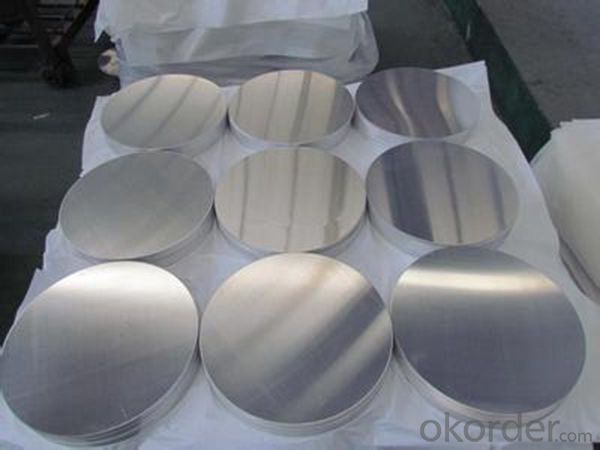
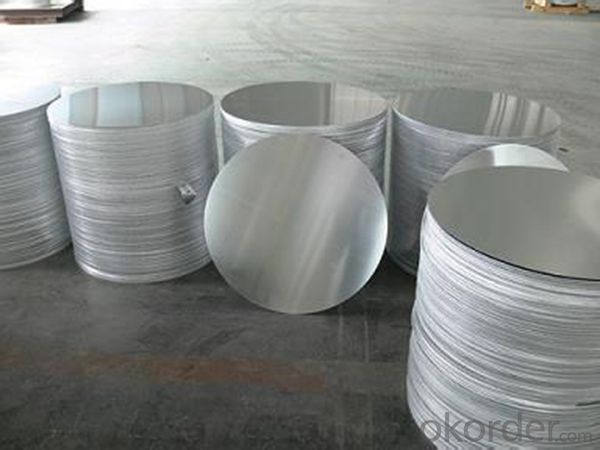
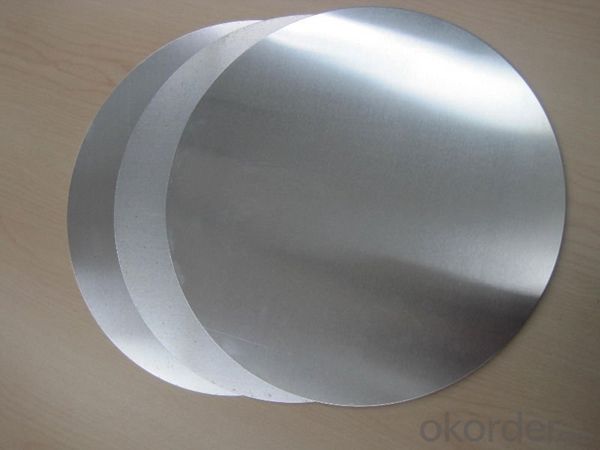
7. Package and shipping of CC Aluminium Circle in Thin Thickness for Pot Lid
First, plastic cloth with drying agent inside; Second, Pearl Wool ; Third, wooden cases with dry agent , fumigation wooden pallets, aluminum surface could cover blue PVC film
8. FAQ
1) What is the delivery time?
Depends on actual order, around 20 to 35 days
2) What is the QC system:
We have QC staff of 20 persons and advanced equipment, each production is with MTC traced from Aluminum ingot lot.
3) What market do you mainly sell to?
Australia, America, Asia, Middle East, Western Europe, Africa etc
- Q:Can aluminum coils be used for roofing applications?
- Yes, aluminum coils can be used for roofing applications. Aluminum is a popular choice for roofing due to its lightweight nature, durability, and resistance to corrosion. It is commonly used for both residential and commercial roofing projects.
- Q:Yep a slogan...the element Aluminum
- Aluminum: Keeping stoners amazed for over 50 years!
- Q:Can aluminum coils be used for food storage and processing?
- Food storage and processing can indeed utilize aluminum coils. The multitude of advantageous properties that aluminum possesses is what makes it a popular choice in this field. Its lightweight nature, strength, and resistance to corrosion create an ideal environment for maintaining the quality and freshness of food. Aluminum coils are versatile and can be used to manufacture a wide range of equipment like containers, pans, trays, and foil for food storage and processing. Additionally, the excellent thermal conductivity of aluminum enables efficient cooling and heating of food. Its impermeability to light, moisture, and oxygen is also beneficial in preventing spoilage and contamination. In conclusion, aluminum coils offer a reliable and secure option for food storage and processing needs.
- Q:How exactly can you tell (just by looking) that the nipple used to tighten a spoke is brass and not aluminum? I know some are silver - not sure if they are painted silver or what. But without scraping or causing any damage to the nipple, how would one know for sure if they have no experience between the two.p.s. I don't know how heavy or light either is, so if that is one way to tel, it's not a good way for me.
- Not ure
- Q:Are aluminum coils suitable for fire-resistant applications?
- Fire-resistant applications are not suitable for aluminum coils. This is because aluminum possesses a low melting point and is highly flammable, thus making it an inadequate option for fire-resistant applications. In fact, aluminum can actually aid in the propagation of fire due to its combustible nature. For fire-resistant applications, it is advisable to use materials like steel or fire-resistant alloys. These materials have a higher melting point and a greater ability to resist fire. They are specifically engineered to endure high temperatures and are less likely to contribute to the spread of fire.
- Q:Are aluminum coils suitable for marine environments?
- Yes, aluminum coils are suitable for marine environments. Aluminum has excellent corrosion resistance properties, making it a popular choice for marine applications. It forms a protective oxide layer that prevents further corrosion, making it ideal for withstanding the harsh saltwater and humid conditions found in marine environments. Additionally, aluminum coils are lightweight, durable, and easy to maintain, making them a reliable option for marine applications.
- Q:Are there any limitations to the minimum coil width of aluminum coils?
- Yes, there are limitations to the minimum coil width of aluminum coils. These limitations depend on various factors such as the type and thickness of the aluminum, the specific manufacturing process, and the equipment used. Generally, the minimum coil width is determined by the capabilities of the rolling mills or slitters used in the production process. These machines have certain minimum width settings that cannot be exceeded. Additionally, extremely narrow coil widths may pose challenges in terms of handling, transportation, and processing.
- Q:i am thnking of building my own aluminum john boat and using the propulsion from a jetski to power it, i was wondering if anyone had taken on a project like this and had a few pieces of advice to offer while i am still in the planning stages. the biggest concern i have right now involves the tunnel for the intake, should i use the original fiberglass from the jetski or build up a tunnel out of aluminum for it?
- While I have not built a john boat of aluminum, I have built or fabricated a lot of other things. If this were my project, and as it is the scoop you are talking about, not the tunnel itself. Aluminum is one of the most expansive metals, and I do not see you being able to seal a fiberglass/aluminum interface with much promise of it holding long term. I would fabricate or mold a new one of aluminum so it would have the same expansion rate as the metal around it. Electrolysis is not an issue, but I think the thermal expansion difference would be on the seals. good luck on your project, sounds fun.
- Q:How are aluminum coils shipped and transported?
- Aluminum coils tend to be shipped and transported in various ways, depending on factors like size, weight, and destination. Below are a few common techniques: 1. Utilizing flatbed trucks: Flatbed trucks are frequently employed when shipping smaller aluminum coils for shorter distances. These coils are securely loaded onto the flatbed and fastened with straps or chains to prevent any movement during transportation. 2. Opting for intermodal containers: When shipping aluminum coils over longer distances, intermodal containers are a popular choice. These containers can be loaded onto trucks, trains, or ships, providing versatility. The coils are typically stacked and secured within the container using bracing or blocking materials to avoid any shifting. 3. Employing rail transport: Rail transport is also an option for transporting aluminum coils, particularly over longer distances. Coils are loaded onto flatcars or specialized coil cars that have built-in cradles or bolsters to securely hold the coils in place during transit. 4. Utilizing vessels: For international or distant shipments of aluminum coils, sea transport via cargo vessels is often used. Coils are carefully loaded into the cargo hold of the vessel and secured with lashings or other methods to prevent any movement or damage during the voyage. Regardless of the chosen transportation method, it is crucial to ensure that the aluminum coils are adequately protected from moisture, dust, and other potential sources of damage during transit. Packaging materials like moisture-resistant wrapping, protective covers, or crates are employed to safeguard the coils and maintain their quality until they reach their destination.
- Q:What are the standard tolerance levels for aluminum coils?
- The standard tolerance levels for aluminum coils can vary depending on the specific industry and application. However, in general, the tolerance levels for aluminum coils are determined by industry standards and specifications such as ASTM (American Society for Testing and Materials) or ISO (International Organization for Standardization). For thickness, the standard tolerance levels for aluminum coils can range from +/- 0.002 inches to +/- 0.020 inches, depending on the specific grade and thickness of the aluminum. Similarly, for width, the tolerance levels can vary from +/- 0.010 inches to +/- 0.250 inches. In terms of flatness, the standard tolerance levels for aluminum coils are typically specified as a maximum deviation from a flat plane. This can range from as low as 0.001 inches to as high as 0.020 inches, depending on the specific requirements of the application. Other factors that may influence tolerance levels include the surface finish, edge condition, and mechanical properties of the aluminum coils. It is important to consult the relevant industry standards and specifications, as well as the specific requirements of the application, to determine the appropriate tolerance levels for aluminum coils.
1. Manufacturer Overview |
|
|---|---|
| Location | |
| Year Established | |
| Annual Output Value | |
| Main Markets | |
| Company Certifications | |
2. Manufacturer Certificates |
|
|---|---|
| a) Certification Name | |
| Range | |
| Reference | |
| Validity Period | |
3. Manufacturer Capability |
|
|---|---|
| a)Trade Capacity | |
| Nearest Port | |
| Export Percentage | |
| No.of Employees in Trade Department | |
| Language Spoken: | |
| b)Factory Information | |
| Factory Size: | |
| No. of Production Lines | |
| Contract Manufacturing | |
| Product Price Range | |
Send your message to us
CC Aluminium Circle in Thin Thickness for Pot Lid
- Loading Port:
- Shanghai
- Payment Terms:
- TT OR LC
- Min Order Qty:
- 5 m.t.
- Supply Capability:
- 1000 m.t./month
OKorder Service Pledge
OKorder Financial Service
Similar products
New products
Hot products
Hot Searches
Related keywords
